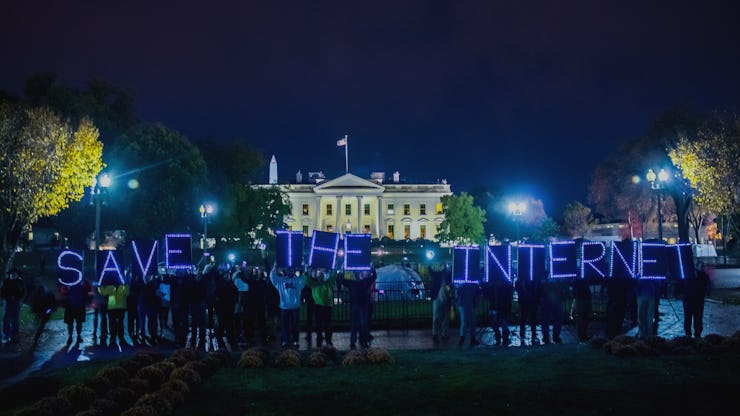U.S. internet freedom score drops for third year straight
We're pretty free, but we used to be more free.

The U.S. has many more internet freedoms than countries like China or Russia, but Americans are slowly losing internet freedoms they previously enjoyed. A new report from the political freedom advocacy group Freedom House states the U.S. has dropped in its internet freedom score for the third year in a row, falling from a 78 to a 77 on a rubric of 100.
That ties the United States with Australia and the United Kingdom, but leaves it behind four countries including neighbor Canada and Iceland, which Freedom House scores as having the greatest level of internet freedom. Freedom House measures obstacles to internet access, limits on content, and violations of user rights.
In 2018, the U.S. dropped in the ranking because of net neutrality being repealed. In 2017, the U.S. dropped because of the disinformation campaigns that plagued the 2016 presidential election. This year, Freedom House says that American internet freedom fell because certain law enforcement agencies have increasingly been surveilling people’s social media and electronic devices without a warrant.
Allie Funk, a research analyst for Freedom House, tells Inverse that this was primarily being done by immigration agencies. She says this surveillance is “eschewing robust oversight transparency.”
“We found that—particularly immigration officials—were monitoring social media platforms and conducting warrantless of electronic devices at airports,” Funk says. “We found a number of cases where this was actually infringing on constitutionally-protected activities, such as peaceful protests and with journalists.”
Funk says the Trump administration has emboldened these agencies to behave in this way, and that there has been an over 300 percent increase in electronic devices being inspected at the border without a warrant since he took office. This doesn’t just happen to immigrants but also to American citizens. She says the government needs to create “robust” privacy protections for the public and that there needs to be “strong transparency and judicial oversight” over surveillance programs.
See also: Cryptography May Hold the Key to Preventing a Surveillance Dystopia
Freedom House’s report explains that governments are increasingly finding that disinformation campaigns work better to influence the public than censorship, and there has been a steady rise in disinformation being used on social media to influence people. In the U.S., Funk says we can see how information is spread by the president and many other government officials and what effect this has.
“We have disinformation that’s increasingly home-grown, and it’s coming from alternative and hyper-partisan news pages and also ordinary users,” Funk says. “What I think is concerning is that a lot of the people spreading disinformation and these campaigns are being emboldened by government officials and politicians. We’ve seen evidence that President Trump himself is propagating misleading, fraudulent and conspiracist content online and how that has seeped into mainstream news.”
These problems don’t only relate to the behavior of politician. Private companies like Facebook have been contributing to the lowered score. Funk says it’s time for these companies to be “fairly regulated” to increase transparency and oversight.
Change in freedom score since last year.
“The platforms that are being used to manipulate elections and spy on citizens—they’re largely American companies—so the U.S. bears a very unique responsibility for addressing these threats,” Funk says.
Americans have a complicated relationship with their internet privacy, often wishing for tighter security while continuing to use frequent sites where their data is sold. It’s a problem Freedom House is fighting to change through educating the public on why these issues matter. Funk explains that people who don’t think they have anything to hide should realize that there is no reason to trust the technology that is looking through our data.
“The technology that these different local and federal agencies are using is actually highly inaccurate,” Funk says. “Even if you’ve done nothing wrong, it can be misconstrued in a way that people may think you’ve done something wrong.” Saying something is “the bomb” on social media, for example, could be the sign to an algorithm to place you on a list of possible threats.
America is already behind in terms of properly regulating social media and keeping up with advancements in technology that could threaten our freedoms, and Freedom House says the country’s internet users must catch up before things get even worse.
“The time is now to fix social media so we can get prepared to tackle the next big frontier of technology,” Funk says.